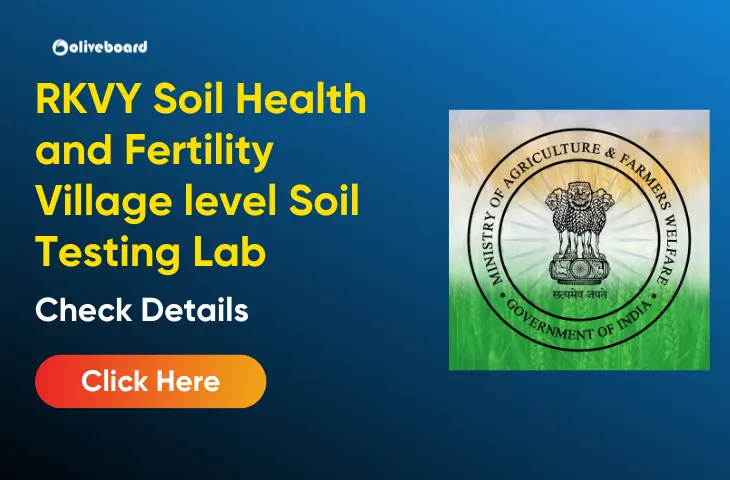RKVY Soil Health and Fertility Village level Soil Testing Lab
RKVY Soil Health and Fertility Village level Soil Testing Lab: In a bid to revolutionize agricultural practices at the grassroots level, a unique initiative has been launched to establish Village-Level Soil Testing Labs (VLSTL). This program encourages the active participation of rural youth, village-level entrepreneurs, Self-Help Groups (SHGs) formed under The Rural Awareness Works Experience (RAWE) program, Krishi Sakhis, students from government schools, and agriculture graduates from State Agricultural Universities (SAUs), PACS, etc. The operational helm of these labs is entrusted to the capable hands of local youth.
Financial Support for VLSTL Establishment
Under this groundbreaking scheme, a one-time financial assistance of Rs 1.5 lakh is provided for the establishment of VLSTL. This financial aid is crucial for the acquisition of essential components for the labs, ensuring their effective functionality.
Components and Costs Breakdown
The financial assistance is allocated for specific components required for soil testing, ensuring a comprehensive setup. The cost breakdown includes:
- Soil Testing Equipment (Rs. 1.00 lakh): Covering reagents, sample shaker machine, and Annual Maintenance Contract (AMC) for one year.
- Laboratory Consumables (Rs. 0.50 lakh): Encompassing distilled water, pH meter, conductivity meter, electronic balance, glassware, filter papers, and other need-based consumables.
This meticulous allocation aims to create a robust infrastructure for soil testing at the village level.
Payment Mechanism and Key Objectives
The disbursement of funds to VLSTLs follows a Direct Benefit Transfer (DBT) mode, with the provision handled by the respective state authorities. The overarching objectives of this mission are multifaceted:
- Accessible Soil Testing: Providing easy access to soil testing facilities for farmers at the grassroots level, eliminating the need for extensive travel.
- Timely and Accurate Results: Furnishing farmers with timely and accurate soil analysis results for informed decision-making on fertilizer application and soil management.
- Customized Recommendations: Offering customized soil nutrient recommendations based on test results, optimizing fertilizer use and minimizing costs.
- Awareness and Education: Increasing awareness among farmers about soil health and the significance of soil testing.
- Employment Generation: Creating employment opportunities at the village level, particularly for rural youth.
- Strengthening Infrastructure: Reinforcing soil testing laboratories across the country for sustained, long-term soil health monitoring and planning.
Benefits of the Scheme RKVY Soil Health and Fertility Village level Soil Testing Lab
The scheme aims to deliver several tangible benefits:
- Affordable access to soil testing.
- Timely and accurate soil analysis results for farmers.
- Customized soil nutrient recommendations for optimal fertilizer use.
- Enhanced awareness among farmers regarding soil health and testing importance.
- Data gathering for region-specific policy formulation.
- Accelerated employment generation in rural areas.
- Strengthened soil testing infrastructure nationwide.
Eligibility Criteria
To be eligible for this program, applicants must meet the following criteria:
- Age: Between 18 to 27 years.
- Education: Minimum 10th pass with a science background and knowledge of computers.
- Premises: The applicant or entrepreneur group should have their premises or a rented building with a lease agreement for at least four years.
Application Process for RKVY Soil Health and Fertility Village level Soil Testing Lab
The application process involves several steps:
- Beneficiary Identification: Transparent and time-bound identification of individual beneficiaries and community-based beneficiaries.
- Premises Identification: Selection of suitable premises for VLSTL establishment.
- Verification: Verification of proof of procurement of land, equipment, and inputs.
- Proposal Finalization: Finalizing proposals by the State Level Executive Committee (SLEC) within one month.
- Financial Assistance Release: State government releasing financial assistance within a week after application approval.
- Documentation Submission: Entrepreneurs submitting receipts of procurement within 15 days.
Required Documents
Applicants need to submit the following documents:
- Aadhaar number
- Land documents
- Bank details
- Photographs
Specific document requirements may vary depending on the intervention type and state, necessitating consultation with relevant authorities for detailed information.
- SSC CGL Full Form, All You Need to Know About SSC CGL
- SBI CBO Admit Card 2025 Out, Exam Date 20th July
- SSC CHSL 2025 Vacancies Released for 3131 Posts, Complete Details
- SSC JE Vacancies 2025, Check Post Wise Vacancy List
- Important Percentage Questions for SSC Exam Preparation, Solved

